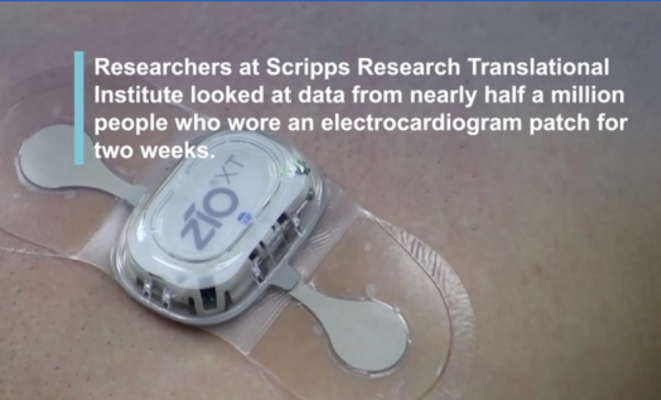
December 13, 2023 — A new artificial intelligence (AI) model designed by Scripps Research scientists could help clinicians better screen patients for atrial fibrillation (or AFib)—an irregular, fast heartbeat that is associated with stroke and heart failure. The model picks up on tiny variations in a person’s normal heartbeat that signify AFib risk, which standard screening tests cannot detect.
The findings, described in the journal npj Digital Medicine on December 12, 2023, used data on nearly half a million people who had each worn an electrocardiogram (ECG) patch to record their heart rhythms for two weeks—a routine screening test for AFib and other heart conditions. An AI model then analyzed this data to find patterns, other than AFib itself, that distinguished people with AFib from those without. This new model holds the potential to better detect those who are at risk for AFib and ultimately prevent this heart condition’s severe side effects, including stroke and heart failure.
“With this new tool, we can better identify patients at high risk of AFib for further tests and interventions,” says senior author Giorgio Quer, PhD, director of artificial intelligence at Scripps Research Translational Institute and an assistant professor of digital medicine at Scripps Research. “Long term, this can help drive the right resources to the right people and potentially reduce the incidence of stroke and heart failure.”
The irregular heartbeat due to AFib can cause blood to pool in the heart and form blood clots, which can then contribute to strokes. AFib is also associated with an increased risk of heart failure or death. To prevent these complications in people with known AFib, clinicians often prescribe anticoagulants—drugs that prevent blood clots— as well as other lifestyle and medical therapies. However, diagnosing AFib can be tricky because many with the condition only have occasional bouts of the irregular heartbeat, or few symptoms.
In some people, AFib causes heart palpitations, lightheadedness, shortness of breath and chest pain. For patients who have these symptoms, cardiologists usually record the heart rhythms for about ten seconds in their office using a very detailed ECG that includes ten electrodes placed on the body. If nothing seems immediately amiss, they recommend continued, at-home monitoring for one or two weeks with a simpler, wearable ECG patch that has just a single electrode. But even over a two-week span, people with very occasional AFib may not have an episode picked up by this device.
That is why Quer, in collaboration with iRhythm Technologies (the maker of a wearable electrocardiogram patch called the ZioXT), set out to find other patterns in the ECG data of people with AFib.
“We believe the electrical activity of the heart is slightly different for people who have AFib, but the differences are so subtle that cardiologists can’t look at a printout of heart rhythms and identify these differences,” says Quer.
The team developed a machine learning model to analyze data that iRhythm had collected on 459,889 people who wore the company’s at-home ECG patch for two weeks. From each ECG, the model used one day of data which contained no AFib. However, it was able to distinguish people who had later AFib from those who didn’t.
Even when the researchers integrated all known AFib risk factors into their own, manual models—including demographic data and ECG measures such as the variability between different heart beats—the machine learning model was more accurate at predicting AFib risk.
“There was a gap between what we could achieve with any known ECG features and what the model could achieve,” says Matteo Gadaleta, PhD, a professional scientific collaborator at the Translational Institute and first author of the paper. “It was significantly better.”
Importantly, the model remained accurate for both an older population, who are at higher risk of AFib, and people under the age of 55, who are at much lower risk and are usually excluded from general AFib screening.
While the model is not intended for the diagnosis of AFib, it is a first step towards the design of a screening test for people who are at increased risk of AFib or those showing symptoms. This way, they could wear an ECG patch for just one day to determine whether longer testing is recommended. Alternatively, the model could analyze one- or two-week ECG data to pinpoint patients who, even without any AFib in that timeframe, should have a repeat test.
“Patients with frequent AFib episodes can be identified easily with an ECG recorded over at least a week,” says Quer. “But this AI model could really help with people who have very infrequent AFib episodes yet could still benefit from diagnosis and intervention.”
Quer and his colleagues hope to plan a prospective study, as well as integrate other sources of data—such as electronic medical records—into their models to improve them even more.
For more information: www.scripps.edu


 February 03, 2026
February 03, 2026 









